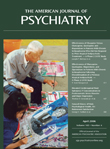Stress Responsivity and HPA Axis Activity in Juveniles: Results From a Home-Based CO 2 Inhalation Study
Abstract
Objective: A previous laboratory-based study found elevated cortisol levels in anxious children susceptible to CO 2 -induced panic, but the effects of parent diagnosis were not considered. The current home-based study tested the hypothesis that parental panic disorder and offspring response to CO 2 are associated with elevated cortisol levels in juvenile offspring. Method: A total of 131 offspring (ages 9–19) of parents with panic disorder, major depression, and no mental disorder underwent CO 2 inhalation. Parent and child diagnoses were assessed. Salivary cortisol was assayed before and after CO 2 inhalation. Results: Neither parents with panic disorder, parents with major depression, or offspring anxiety predicted offspring cortisol levels. Independent of parent and child diagnoses, anxiety response to CO 2 predicted elevated cortisol levels in offspring. Conclusions: As in adults, anxiety response to CO 2 in juveniles is associated with elevated cortisol levels, but elevated cortisol levels are not related to parent or child diagnoses.



